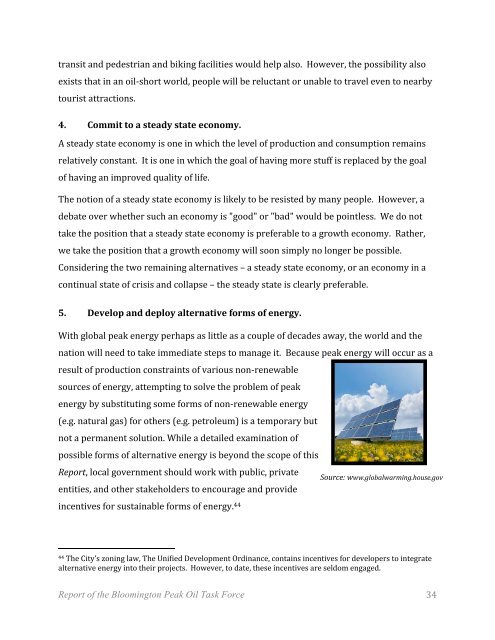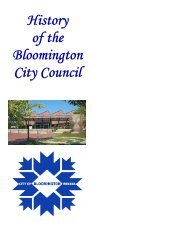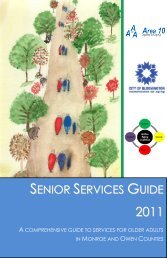Peak Oil Task Force Report - City of Bloomington - State of Indiana
Peak Oil Task Force Report - City of Bloomington - State of Indiana
Peak Oil Task Force Report - City of Bloomington - State of Indiana
Create successful ePaper yourself
Turn your PDF publications into a flip-book with our unique Google optimized e-Paper software.
transit and pedestrian and biking facilities would help also. However, the possibility also<br />
exists that in an oil‐short world, people will be reluctant or unable to travel even to nearby<br />
tourist attractions.<br />
4. Commit to a steady state economy.<br />
A steady state economy is one in which the level <strong>of</strong> production and consumption remains<br />
relatively constant. It is one in which the goal <strong>of</strong> having more stuff is replaced by the goal<br />
<strong>of</strong> having an improved quality <strong>of</strong> life.<br />
The notion <strong>of</strong> a steady state economy is likely to be resisted by many people. However, a<br />
debate over whether such an economy is "good" or "bad" would be pointless. We do not<br />
take the position that a steady state economy is preferable to a growth economy. Rather,<br />
we take the position that a growth economy will soon simply no longer be possible.<br />
Considering the two remaining alternatives – a steady state economy, or an economy in a<br />
continual state <strong>of</strong> crisis and collapse – the steady state is clearly preferable.<br />
5. Develop and deploy alternative forms <strong>of</strong> energy.<br />
With global peak energy perhaps as little as a couple <strong>of</strong> decades away, the world and the<br />
nation will need to take immediate steps to manage it. Because peak energy will occur as a<br />
result <strong>of</strong> production constraints <strong>of</strong> various non‐renewable<br />
sources <strong>of</strong> energy, attempting to solve the problem <strong>of</strong> peak<br />
energy by substituting some forms <strong>of</strong> non‐renewable energy<br />
(e.g. natural gas) for others (e.g. petroleum) is a temporary but<br />
not a permanent solution. While a detailed examination <strong>of</strong><br />
possible forms <strong>of</strong> alternative energy is beyond the scope <strong>of</strong> this<br />
<strong>Report</strong>, local government should work with public, private<br />
entities, and other stakeholders to encourage and provide<br />
incentives for sustainable forms <strong>of</strong> energy. 44<br />
<strong>Report</strong> <strong>of</strong> the <strong>Bloomington</strong> <strong>Peak</strong> <strong>Oil</strong> <strong>Task</strong> <strong>Force</strong><br />
Source: www.globalwarming.house.gov<br />
44 The <strong>City</strong>’s zoning law, The Unified Development Ordinance, contains incentives for developers to integrate<br />
alternative energy into their projects. However, to date, these incentives are seldom engaged.<br />
34









